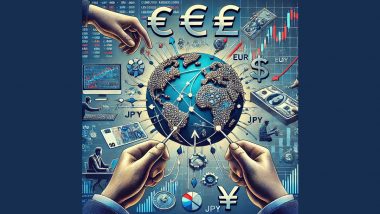Currency manipulation refers to a nation's strategic intervention in the foreign exchange market to influence the value of its currency. This concept has garnered significant attention in international finance due to its potential to impact global trade balances, economic stability, and forex trading. Typically, countries resort to currency manipulation to achieve specific financial objectives, such as boosting exports or controlling inflation.
What is Forex Trading?
To understand what is forex you need to know about currency trading. Forex trading, or foreign exchange or currency trading, is the buying and selling of currencies on the foreign exchange market. The forex market is the world's largest and most liquid financial market, with trillions of dollars traded daily.
Forex trading involves speculating on the price movements of different currency pairs, such as EUR/USD or GBP/JPY. Traders aim to profit from these price movements by buying a currency pair when they believe the value will increase and selling it when they think it will decrease.
Forex trading can be done through a broker or a financial institution, and traders can access the market 24 hours a day, five days a week. It is a high-risk, high-reward market, as the prices of currencies can be volatile and influenced by various factors such as economic indicators, geopolitical events, and market sentiment.
Forex traders need to have a solid understanding of the market, manage risk effectively, and use appropriate trading strategies to be successful in forex trading.
What is Currency Manipulation?
Currency manipulation occurs when a government or central bank deliberately influences the exchange rate of its currency relative to others. Unlike natural market forces, which dictate currency values based on supply and demand dynamics, currency manipulation involves strategic policy actions to alter these dynamics.
Governments and monetary authorities may engage in this practice for several reasons. Countries can make their exports cheaper and more attractive on the international market by devaluing their currency. A stronger currency can make imports more affordable, thus helping to control domestic inflation. Manipulating currency values can also impact interest rate decisions.
Methods of Currency Manipulation
Direct Market Intervention: Central banks buy or sell their currency in the open market. For instance, they would sell large quantities to devalue their currency, increasing supply and reducing value. Adjusting interest rates can influence currency value. Lower interest rates generally lead to a weaker currency as they reduce returns on investments denominated in that currency.
Imposing capital controls and other regulatory measures can also affect currency values. These may include tariffs, quotas, and other restrictions directly or indirectly influencing exchange rates. Countries can use their foreign exchange reserves to influence the value of their currency. A nation can intervene in the forex market by maintaining substantial reserves.
Sometimes, there is illegal currency manipulation, such as insider trading, market manipulation, and money laundering. These activities can harm the stability and integrity of financial markets and are prohibited in many countries. Penalties for unlawful currency manipulation can range from fines to imprisonment. Individuals and financial institutions must comply with regulations and ethical practices to maintain the financial system's integrity.
Impact on Forex Trading
Currency manipulation can have widespread implications for forex trading, which thrives on the volatility and movement of currency exchange rates. When a country manipulates its currency, it introduces artificial volatility into the forex market. Traders thrive on volatility as it creates profit opportunities; however, excessive or unpredictable fluctuations can lead to heightened risks. Sudden and significant changes in currency values can catch traders off guard, leading to substantial losses.
Currency manipulation gives a country an unfair competitive edge by making its exports cheaper. This situation disrupts international trade balance and can lead to tensions and retaliatory measures, further impacting currency values and creating turmoil in the forex market.
When countries manipulate currency, trust in the stability and fairness of the global financial system can be eroded. Traders and investors might become cautious, reducing liquidity and increasing the cost of trading. A less transparent market becomes more complicated to navigate, diminishing the appeal of forex trading.
Currency manipulation can lead to prolonged misalignments between currency values and their underlying economic fundamentals. This disconnect can mislead traders, making it difficult to make informed decisions based on financial indicators and fundamentally skew forex pricing models.
Companies and investors use forex markets to hedge against currency risk. Manipulation disrupts these strategies by introducing unpredictability, potentially leading to unexpected costs and losses.
Central Bank Actions
In response to another country's currency manipulation, other central banks might take countermeasures, leading to tit-for-tat interventions. These actions can create added complexity and uncertainty in the forex market.
Noteworthy Instances of Currency Manipulation
For years, China was accused of keeping its currency, the yuan, undervalued to boost export-led growth. China maintained a competitive trade advantage through direct market interventions and strict control over capital flows. This situation led to substantial economic tensions with trading partners, particularly the United States, and created significant forex market disruptions.
In the 1980s and 1990s, Japan frequently intervened in the forex market to manage the yen's value. These interventions were designed to protect its export-reliant economy. While these actions helped Japan maintain economic stability during challenging times, they also contributed to increased volatility and uncertainty in the global forex market.
Regulatory Framework and Global Responses
To counteract currency manipulation, international bodies and agreements aim to promote fair practices in the forex market. The International Monetary Fund (IMF) has provisions to address exchange rate manipulation among its member countries, encouraging them to avoid competitive devaluation and to work towards ensuring economic stability.
Global Coordination and Trade Agreements
The IMF regularly monitors member countries' exchange rate policies. Through consultations and reports, the IMF assesses whether countries manipulate their currencies and advises on suitable macroeconomic policies.
The G20, which includes the world's largest economies, has repeatedly emphasized the need for exchange rate flexibility. Member states have committed to avoid competitive devaluations and to move towards market-determined exchange rates.
Modern trade agreements increasingly include clauses to address and prevent currency manipulation. For instance, the United States-Mexico-Canada Agreement (USMCA) and the Trans-Pacific Partnership (TPP) have provisions to address concerns about currency manipulation among signatory countries.
Technological Advances and Market Transparency
The increasing use of advanced technology and real-time data analytics in forex trading has added layers of transparency and complexity to the market. High-frequency trading algorithms and sophisticated trading platforms can react to even minute shifts in policy and interventions, amplifying market movements and volatility.
Market Participants' Strategies to Mitigate Risks
Experienced forex traders and institutional investors develop strategies to hedge against the risks introduced by currency manipulation:
By holding a diversified portfolio of currencies and assets, traders can mitigate the risks associated with any single currency being manipulated.
Advanced technical analysis tools help traders identify patterns and predict potential interventions. Employing indicators, chart patterns, and historical data, traders can make more informed decisions even in manipulated markets.
Keeping abreast of economic indicators, geopolitical events, and central bank policies can help traders anticipate when a country might manipulate currency and adjust their strategies accordingly. Stop-loss orders, options strategies, and other risk management tools are essential in navigating the unpredictable waters of a manipulated forex market.
Ethical Considerations and Future Outlook
Currency manipulation raises ethical questions about fairness and transparency in international finance. While some argue that it is a necessary tool for national economic policy, others view it as a distortion that undermines the integrity of the global financial system.
Looking forward, the role of international institutions and collaborative efforts will be crucial in mitigating the negative impacts of currency manipulation. Enhanced regulatory frameworks and greater transparency are needed to curb the practice and foster a more stable and equitable global trading environment.
Additionally, continuous advancements in technology and data analytics will likely contribute to more sophisticated monitoring and detection of currency manipulation. As these tools evolve, they could provide market participants with better insights and quicker responses to governmental interventions, potentially reducing the uncertainty and risks associated with manipulated forex markets.
Conclusion
Currency manipulation remains a contentious issue in international economics and forex trading. By deliberately influencing exchange rates, countries can achieve specific economic goals, but this can lead to significant market distortions, increased volatility, and erosion of trust in the global financial system.
Traders and policymakers must navigate the complexities introduced by currency manipulation with robust analysis, strategic diversification, and advanced risk management. While international efforts to curb manipulation and promote fair trading practices are ongoing, the dynamic nature of global finance ensures that currency manipulation and its impacts on forex trading will remain a critical area of focus for years to come.
Understanding the mechanisms, motivations, and consequences of currency manipulation is paramount for anyone engaged in forex trading. By staying informed and prepared, market participants can better navigate the challenges posed by this pervasive issue and harness opportunities in the ever-evolving landscape of global finance.













 Quickly
Quickly






















